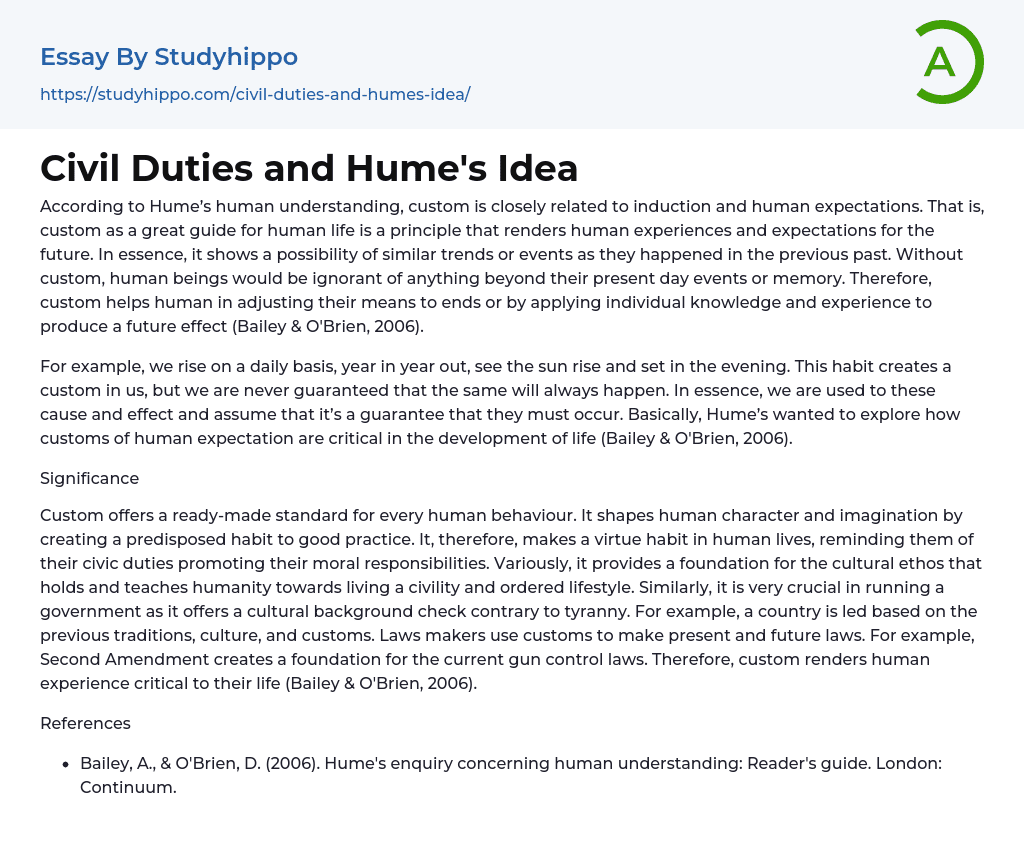According to Hume's theory of human understanding, custom is closely connected to induction and human expectations. Custom serves as a significant guide for human life by shaping our experiences and expectations. Essentially, it suggests that similar trends or events in the future are likely to occur based on past occurrences.
Custom plays a crucial role in human comprehension of the world beyond personal experiences and memories. It enables individuals to adapt their actions based on previous knowledge and experiences (Bailey ; O'Brien, 2006). Take, for instance, our daily observation of the sunrise and sunset over time. Although these recurring occurrences establish a feeling of custom, there is no definitive guarantee that they will always occur. Nevertheless, we have become familiar with the cause-and-effect relationship and now hold firm in their inevitability.
Essentially, Hume's goal was to explore the s
...ignificance of human customs in the development of life (Bailey ; O'Brien, 2006).
Custom serves as a pre-established measure for all human actions. It shapes individuals' character and creativity by fostering an inherent tendency towards ethical behavior. Consequently, it fosters virtuous patterns in people's lives and acts as a constant reminder of their civic duties and moral responsibilities.
The cultural ethos that promotes a civil and orderly lifestyle is crucial in various aspects such as guiding humanity and running a government. It serves as a cultural background check against tyranny, as it influences a country's leadership based on traditions, culture, and customs. In the context of lawmaking, customs are utilized to create present and future laws, as seen in the establishment of gun control laws through the foundation provided by the Second Amendment.
Therefore, according to Bailey
O'Brien (2006), custom plays a crucial role in shaping human experience in life.
References
- Bailey, A., ; O'Brien, D. (2006). Hume's enquiry concerning human understanding: Reader's guide. London: Continuum.
- Acceptance essays
- Age Of Enlightenment essays
- Child Observation essays
- Confucianism essays
- Conscience essays
- Critical Reflection essays
- Destiny essays
- Determinism essays
- Empiricism essays
- Environmentalism essays
- Epistemology essays
- Ethics essays
- Ethos essays
- Existence essays
- Existentialism essays
- Fate essays
- Free Will essays
- Functionalism essays
- Future essays
- Good And Evil essays
- Human Nature essays
- Individualism essays
- Meaning Of Life essays
- Metaphysics essays
- Natural Law essays
- Personal Philosophy essays
- Philosophers essays
- Philosophy Of Life essays
- Political Philosophy essays
- Pragmatism essays
- Reality essays
- Relativism essays
- Teaching Philosophy essays
- Time essays
- Transcendentalism essays
- Truth essays
- Utilitarianism essays
- Bill Of Rights essays
- Civil Liberties essays
- First Amendment To The United States Constitution essays
- Fourth Amendment To The United States Constitution essays
- Second amendment essays




